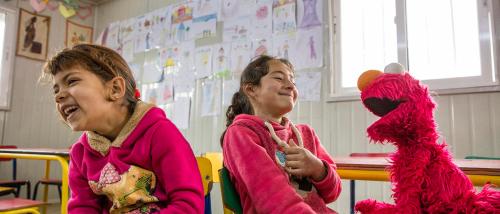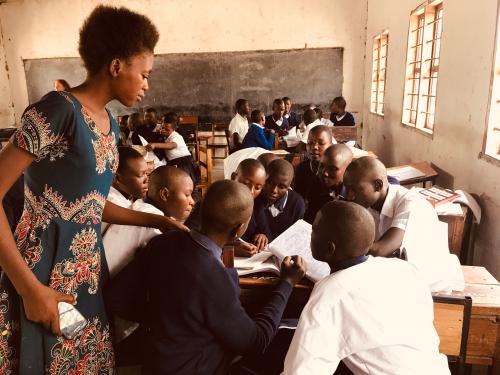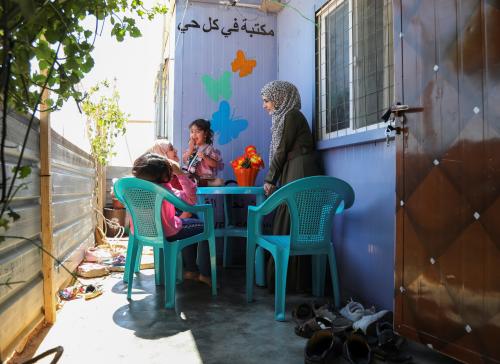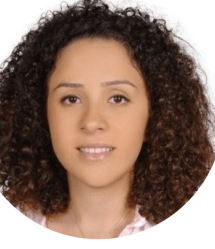Learning starts long before most children enter school, and research has shown that play-based learning is linked to improved education and developmental outcomes that expand far beyond the early years. Yet supportive, safe opportunities to learn through play are often lacking in many countries, especially in humanitarian contexts or where crisis and conflict have impacted families’ lives.
In an effort to strengthen quality early learning and development opportunities for more children across the Middle East, the International Rescue Committee (IRC) and Sesame Workshop have been collaborating with government and civil society partners through Ahlan Simsim, a regional initiative to support a generation of young children displaced by crisis to learn, grow, and thrive. Coupled with a new, locally produced Arabic-language version of Sesame Street, Ahlan Simsim reaches children, parents, teachers, and community leaders in areas affected by the Syrian crisis with early childhood programs. The initiative equips children and their caregivers with the skills and knowledge for healthy growth and development, and includes preschool classrooms and other early education programs, parenting sessions, and home visiting programs provided via a combination of remote and in-person delivery. This work comes alongside ongoing advocacy for quality early childhood development (ECD) for all children across the region. One of the core elements of all Ahlan Simsim work is a focus on social-emotional learning (SEL) and learning through play (LtP).
Ahlan Simsim’s scaling journey
Since 2019, the IRC and the Center for Universal Education (CUE) at Brookings have been studying efforts to scale the impact of Ahlan Simsim in Jordan through a Real-time Scaling Lab, a participatory action research approach to learn about and support scaling efforts. Over the past few years, important insights have emerged from the IRC’s efforts to support integration of SEL and LtP activities into the Jordanian education system through comprehensive services such as teachers’ continuous professional development (CPD), learning resources (teachers’ guides), and Ministry of Education-led programs including School Readiness (SRP) and Remedial (REP) programs. These efforts provide children with quality early childhood education (ECE) now, as well as support long-term shifts in how Ministry of Education services reach and engage young children with quality early learning. The ultimate goal of this approach, when at scale, is to improve early learning outcomes for all children in Jordan from KG1 (equivalent to preschool in the U.S.) through grade 3 (Figure 1).
Figure 1. Ahlan Simsim’s scaling journey with the Ministry of Education in Jordan
Notes: School Readiness Program (SRP) – National program for children who didn’t attend KG to help them prepare for entry into grade 1. Remedial Education Program (REP) – National program for children grades 1-3 to help catch up on missed education, expanded during the pandemic. Continuous Professional Development for Teachers (CPD) – National ongoing training and support program for all Ministry of Education teachers.
Source: Authors’ analysis.
From the start, the Ahlan Simsim approach has dually focused on meeting immediate needs and creating long-term, sustained impact. This has meant not only designing high-quality ECD programs delivered by the IRC or partners but also co-designing tailored initiatives with national government (including the education sector as well as the health and social development sectors) and civil society organizations that respond to the needs of families and strengthen existing ECD systems. In Jordan, these scaling pathways align with the ECD objectives in the National Human Resources Development Strategy (HRDS). In short, the aim has always been to ensure the availability of quality ECD opportunities for more young children rather than replicate a specific model. While reaching these ambitions is still underway, the following insights have emerged and can inform ongoing efforts in Jordan, as well as other crisis-affected countries.
Insight 1: The approach should respond to national demand and critical gaps
While quality early learning for all children is a national priority in Jordan and enshrined in the 2016-2025 HRDS, as in many countries, its availability remains limited—particularly for children who are disadvantaged or displaced. This includes both access to pre-primary school experiences and the quality of early learning happening once children attend school. Ahlan Simsim’s suite of ECD resources and evidence-based approaches respond to a critical gap identified by the Ministry of Education, teachers, and communities—the need to integrate SEL and LtP approaches into existing early childhood education services. Driven by a partner-centered and systems-based approach, the IRC started by identifying this need with the ministry as well as local communities, then aligning these with national policies, and finally identifying the core competencies and program components from Ahlan Simsim that could help fill these gaps. The national SRP, which prepares children who did attend preschool for entry in grade 1, was identified by all partners as a unique opportunity to integrate SEL and LtP approaches into an existing program and thereby reach many marginalized children who did not attend preschool with important social-emotional skills to help them thrive in school and beyond.
Insight 2: Organizations seeking to scale an initiative may need to become less visible over time for greatest impact and sustainability
This shift in mindset from scaling a specific project to aligning partners to work toward a shared vision of change also led to a change in the day-to-day details of implementation and partners’ roles. For example, over time, rather than focusing on developing and expanding the reach of specific Ahlan Simsim materials, the IRC focused on sharing evidence-based SEL frameworks, activities, and training approaches for adaptation and integration into the SRP and national teachers’ trainings and guides, as requested by the Ministry of Education and other partners. Shifts like this exemplify how over time the IRC has adapted from being the originator of a particular initiative to becoming a behind-the-scenes supporter of government implementers who share a common vision. This shift by organizations seeking to scale may necessitate letting go of branding or visibility in return for expanded impact and sustainability. Flexible funding partners are also critical to enable this shift from original designs to adapting those designs to deliver programs or services that best address gaps.
Insight 3: Flexibility is essential in a rapidly evolving landscape
As COVID-19 exacerbated the need for SEL alongside other learning for all children who had been out of school for the past year, the Ministry of Education proposed adapting the SRP to integrate into a three-week existing REP, thereby enabling the national remedial program to expand to all grade 1 students. The Ahlan Simsim project team worked closely with these same partners to integrate SEL and LtP into teacher training for the program. This then led to an opportunity to integrate this same content into the teacher CPD program for all grade 1 teachers, expanding beyond just those teaching the REP. While the REP and the CPD had not been a part of the original scaling plan, the focus on meeting emerging critical needs (rather than scaling a specific, rigid model), along with the strength of the partnership, enabled the Ministry of Education and the IRC to respond to this new challenge and apply their previous work to an initiative with the potential for even broader reach. It also opened the window to more long-term and sustainable impact by embedding this content into the Ministry’s CPD program for teachers KG – grade 3, which has an existing annual budget line.
Given that financing is a significant concern for government ministries seeking to scale sustainably, embedding components of delivery within existing budget lines (rather than trying to identify new funding) is an optimal avenue where possible, particularly for scaling partners whose resources are stretched or who rely on external funding for program expansion.
Next steps
Ahlan Simsim is part of a larger effort to strengthen the ECD system for all children in Jordan, with considerable advances made and interesting lessons learned about what it takes to sustainably scale the impact of quality ECD approaches. Looking ahead, it will be important to continue to learn, adapt, and institutionalize these efforts within the Jordanian government to ensure all young children in Jordan have access to quality early learning opportunities.











Commentary
3 insights on expanding the impact of early learning opportunities in Jordan
May 19, 2022